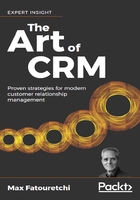
Chapter 1. What is CRM?
Orchestrate your business and get your team on the same page with a central repository of customer data.
In a nutshell, customer relationship management (CRM) is about process efficiency, reducing operational costs, and improving customer interactions and experience. In today's world, building a deeper and closer relationship with customers is critical to any business’ success. Harder economic fundamentals, increasing competition, stricter regulations, digital disrupters, demanding customers, mobility, and price sensitivity are shifting the power from companies to customers.
If you are starting your CRM journey and you're an architect, project manager, business owner, or a business analyst, never be shy in asking each and every key stakeholder on your team about their view on CRM. You could ask them:
- Where do they want to go with it?
- How do they view the outcome?
- What do they expect from the system?
- What is the role they play in this journey?
The never-ending CRM journey could be beautiful and exciting; it's something that matters to all the stakeholders in a company. One important idea that I live by is that CRM matters to people in all roles in a company and everyone needs to feel a sense of ownership right from the beginning of the journey.
The sense of ownership in a CRM project, regardless of whether it's a new or even an upgraded project, is important and needs to be nurtured right from the start by all employees at all levels. From the CEO to business leaders, managers, sales, marketing, and service personnel, everyone is affected by a CRM implementation, and they all need to be involved. It's important for stakeholders to have a clear understanding of the vision statement of a CRM project. This can be achieved by maintaining good communication about a project and building a solution that will address individual business pain points.